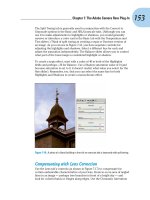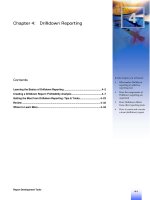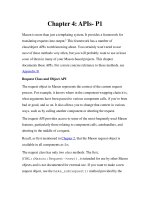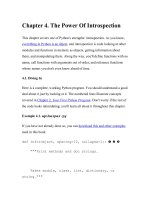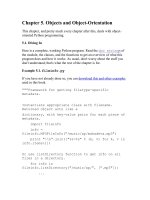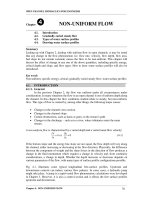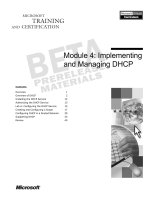Chapter 4 Parameters and Overloading ppt
Bạn đang xem bản rút gọn của tài liệu. Xem và tải ngay bản đầy đủ của tài liệu tại đây (827.01 KB, 41 trang )
Chapter 4
Parameters
and Overloading
Copyright © 2006 Pearson Addison-
Wesley. All rights reserved.
4-2
Learning Objectives
♦
Parameters
♦
Call-by-value
♦
Call-by-reference
♦
Mixed parameter-lists
♦
Overloading and Default Arguments
♦
Examples, Rules
♦
Testing and Debugging Functions
♦
assert Macro
♦
Stubs, Drivers
Copyright © 2006 Pearson Addison-
Wesley. All rights reserved.
4-3
Parameters
♦
Two methods of passing arguments
as parameters
♦
Call-by-value
♦
"copy" of value is passed
♦
Call-by-reference
♦
"address of" actual argument is passed
Copyright © 2006 Pearson Addison-
Wesley. All rights reserved.
4-4
Call-by-Value Parameters
♦
Copy of actual argument passed
♦
Considered "local variable" inside function
♦
If modified, only "local copy" changes
♦
Function has no access to "actual argument"
from caller
♦
This is the default method
♦
Used in all examples thus far
Copyright © 2006 Pearson Addison-
Wesley. All rights reserved.
4-5
Call-by-Value Example:
Display 4.1 Formal Parameter Used
as a Local Variable (1 of 3)
Copyright © 2006 Pearson Addison-
Wesley. All rights reserved.
4-6
Call-by-Value Example:
Display 4.1 Formal Parameter Used
as a Local Variable (2 of 3)
Copyright © 2006 Pearson Addison-
Wesley. All rights reserved.
4-7
Call-by-Value Example:
Display 4.1 Formal Parameter Used
as a Local Variable (3 of 3)
Copyright © 2006 Pearson Addison-
Wesley. All rights reserved.
4-8
Call-by-Value Pitfall
♦
Common Mistake:
♦
Declaring parameter "again" inside function:
double fee(int hoursWorked, int minutesWorked)
{
int quarterHours; // local variable
int minutesWorked // NO!
}
♦
Compiler error results
♦
"Redefinition error…"
♦
Value arguments ARE like "local variables"
♦
But function gets them "automatically"
Copyright © 2006 Pearson Addison-
Wesley. All rights reserved.
4-9
Call-By-Reference Parameters
♦
Used to provide access to caller’s
actual argument
♦
Caller’s data can be modified by called
function!
♦
Typically used for input function
♦
To retrieve data for caller
♦
Data is then "given" to caller
♦
Specified by ampersand, &, after type
in formal parameter list
Copyright © 2006 Pearson Addison-
Wesley. All rights reserved.
4-10
Call-By-Reference Example:
Display 4.1 Call-by-Reference
Parameters (1 of 3)
Copyright © 2006 Pearson Addison-
Wesley. All rights reserved.
4-11
Call-By-Reference Example:
Display 4.1 Call-by-Reference
Parameters (2 of 3)
Copyright © 2006 Pearson Addison-
Wesley. All rights reserved.
4-12
Call-By-Reference Example:
Display 4.1 Call-by-Reference
Parameters (3 of 3)
Copyright © 2006 Pearson Addison-
Wesley. All rights reserved.
4-13
Call-By-Reference Details
♦
What’s really passed in?
♦
A "reference" back to caller’s
actual argument!
♦
Refers to memory location of
actual argument
♦
Called "address", which is a unique number
referring to distinct place in memory
Copyright © 2006 Pearson Addison-
Wesley. All rights reserved.
4-14
Constant Reference Parameters
♦
Reference arguments inherently
"dangerous"
♦
Caller’s data can be changed
♦
Often this is desired, sometimes not
♦
To "protect" data, & still pass by reference:
♦
Use const keyword
♦
void sendConstRef( const int &par1,
const int &par2);
♦
Makes arguments "read-only" by function
♦
No changes allowed inside function body
Copyright © 2006 Pearson Addison-
Wesley. All rights reserved.
4-15
Parameters and Arguments
♦
Confusing terms, often used interchangeably
♦
True meanings:
♦
Formal parameters
♦
In function declaration and function definition
♦
Arguments
♦
Used to "fill-in" a formal parameter
♦
In function call (argument list)
♦
Call-by-value & Call-by-reference
♦
Simply the "mechanism" used in plug-in process
Copyright © 2006 Pearson Addison-
Wesley. All rights reserved.
4-16
Mixed Parameter Lists
♦
Can combine passing mechanisms
♦
Parameter lists can include pass-by-value
and pass-by-reference parameters
♦
Order of arguments in list is critical:
void mixedCall(int & par1, int par2, double &
par3);
♦
Function call:
mixedCall(arg1, arg2, arg3);
♦
arg1 must be integer type, is passed by reference
♦
arg2 must be integer type, is passed by value
♦
arg3 must be double type, is passed by reference
Copyright © 2006 Pearson Addison-
Wesley. All rights reserved.
4-17
Choosing Formal Parameter Names
♦
Same rule as naming any identifier:
♦
Meaningful names!
♦
Functions as "self-contained modules"
♦
Designed separately from rest of program
♦
Assigned to teams of programmers
♦
All must "understand" proper function use
♦
OK if formal parameter names are same
as argument names
♦
Choose function names with same rules
Copyright © 2006 Pearson Addison-
Wesley. All rights reserved.
4-18
Overloading
♦
Same function name
♦
Different parameter lists
♦
Two separate function definitions
♦
Function "signature"
♦
Function name & parameter list
♦
Must be "unique" for each function definition
♦
Allows same task performed on different data
Copyright © 2006 Pearson Addison-
Wesley. All rights reserved.
4-19
Overloading Example: Average
♦
Function computes average of 2 numbers:
double average(double n1, double n2)
{
return ((n1 + n2) / 2.0);
}
♦
Now compute average of 3 numbers:
double average(double n1, double n2, double n3)
{
return ((n1 + n2) / 2.0);
}
♦
Same name, two functions
Copyright © 2006 Pearson Addison-
Wesley. All rights reserved.
4-20
Overloaded Average() Cont’d
♦
Which function gets called?
♦
Depends on function call itself:
♦
avg = average(5.2, 6.7);
♦
Calls "two-parameter average()"
♦
avg = average(6.5, 8.5, 4.2);
♦
Calls "three-parameter average()"
♦
Compiler resolves invocation based on
signature of function call
♦
"Matches" call with appropriate function
♦
Each considered separate function
Copyright © 2006 Pearson Addison-
Wesley. All rights reserved.
4-21
Overloading Pitfall
♦
Only overload "same-task" functions
♦
A mpg() function should always perform
same task, in all overloads
♦
Otherwise, unpredictable results
♦
C++ function call resolution:
♦
1
st
: looks for exact signature
♦
2
nd
: looks for "compatible" signature
Copyright © 2006 Pearson Addison-
Wesley. All rights reserved.
4-22
Overloading Resolution
♦
1
st
: Exact Match
♦
Looks for exact signature
♦
Where no argument conversion required
♦
2
nd
: Compatible Match
♦
Looks for "compatible" signature where
automatic type conversion is possible:
♦
1
st
with promotion (e.g., intdouble)
♦
No loss of data
♦
2
nd
with demotion (e.g., doubleint)
♦
Possible loss of data
Copyright © 2006 Pearson Addison-
Wesley. All rights reserved.
4-23
Overloading Resolution Example
♦
Given following functions:
♦
1. void f(int n, double m);
2. void f(double n, int m);
3. void f(int n, int m);
♦
These calls:
f(98, 99); Calls #3
f(5.3, 4); Calls #2
f(4.3, 5.2); Calls ???
♦
Avoid such confusing overloading
Copyright © 2006 Pearson Addison-
Wesley. All rights reserved.
4-24
Automatic Type Conversion
and Overloading
♦
Numeric formal parameters typically
made "double" type
♦
Allows for "any" numeric type
♦
Any "subordinate" data automatically promoted
♦
int double
♦
float double
♦
char double *More on this later!
♦
Avoids overloading for different numeric types
Copyright © 2006 Pearson Addison-
Wesley. All rights reserved.
4-25
Automatic Type Conversion
and Overloading Example
♦
double mpg(double miles, double gallons)
{
return (miles/gallons);
}
♦
Example function calls:
♦
mpgComputed = mpg(5, 20);
♦
Converts 5 & 20 to doubles, then passes
♦
mpgComputed = mpg(5.8, 20.2);
♦
No conversion necessary
♦
mpgComputed = mpg(5, 2.4);
♦
Converts 5 to 5.0, then passes values to function
